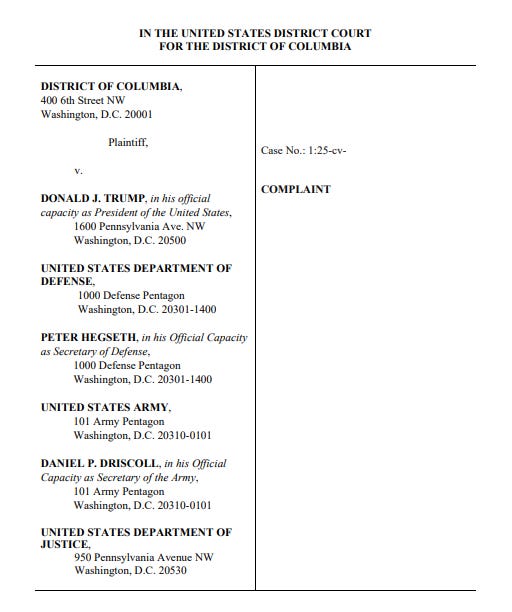"Complaint"
Authoritarianism in DC
The street was wrong before Maya even saw the soldiers.
Shops that normally spilled light and chatter were shuttered. Their windows mirrored back armored vehicles crouched low on the asphalt. The hum of engines swallowed the block’s familiar sounds. No music. No vendors calling out. Just the scrape of boots against concrete.
She clutched her bag tighter, protest signs jutting from its zipper. On the corner, the man who usually hawked go-go CDs sat behind his stand, hands idle, gaze lowered. A group of teenagers laughed too loud, their voices brittle with nerves.
A sergeant’s bark cut through the air.
“Keep moving.”
The kids scattered. The laughter vanished.
Maya kept walking. Faster now. Heart hammering as if to record each moment.
By nightfall, she was in the Attorney General’s office.
The space smelled of stale coffee and toner. Legal pads stacked like fortifications rimmed the desk. A half-drained cup sweated on a statute book.
Brian Schwalb leaned back in his chair, eyes rubbed raw behind his glasses.
“We’re suing everyone,” he said. “President. Pentagon. DOJ. Even the Marshals.”
Maya flipped through the complaint. Citations bled across the pages — Posse Comitatus, Home Rule, militia clauses. The language was sharp, clinical.
“They’ll argue necessity,” she said. “That the city’s unmanageable.”
Brian looked at her, heavy with fatigue but steady.
“Do you believe that?”
Her throat tightened. She saw again the shopkeeper’s empty stare. The teenagers scattering into shadows. The silence on 14th Street.
She shook her head. “No. Nothing justifies tanks on residential streets.”
“Then we fight,” he said. No fire. Just certainty.
The courtroom was colder than she expected.
Marble walls trapped every sound, then crushed it to silence. Reporters jammed the gallery, pens ready, cameras humming faintly like insects.
At counsel’s table, Maya shuffled her notes. Pages damp with sweat stuck together. She wasn’t supposed to speak — Brian would argue standing. She repeated that to herself like a prayer.
But when Judge Ramirez narrowed his eyes and asked the question — “How does the District even have standing here?” — Brian turned.
“Maya?”
Her body moved before her mind caught up. She rose, hands trembling, throat dry.
“Your Honor…” The words came thin at first, but gathered weight as they left her. “The District never asked for these troops. The President cannot turn us into a proving ground for military policing simply because we lack statehood. This violates the Constitution, the Home Rule Act, and the compact governing the Guard. If permitted, it sets a precedent that no community in America controls its own streets.”
Silence.
Even the shuffle of boots outside the courthouse felt distant now, as though the soldiers themselves paused to listen.
Judge Ramirez leaned forward. “You call it occupation. That’s a loaded word.”
Maya steadied her breath. “It’s the only honest one.”
The gavel cracked.
“We’ll recess.”
Flashbulbs burst. Reporters surged.
Brian laid a hand on her shoulder. No words. None needed.
Outside, another Humvee idled at the curb. Exhaust curled into the night.
A soldier met her gaze.
And this time, she didn’t look away.


